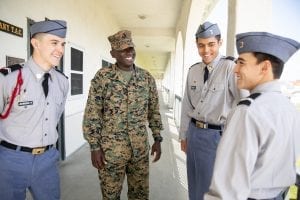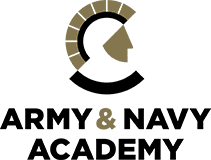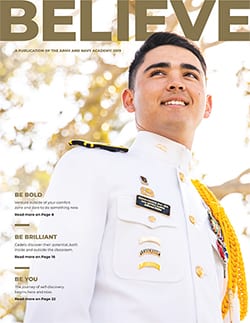 “Cadets at military schools learn to be leaders of character who are able to assess dynamic situations, make informed and timely decisions and bring to any environment.” –Association of Military Schools and Colleges of the United States
“Cadets at military schools learn to be leaders of character who are able to assess dynamic situations, make informed and timely decisions and bring to any environment.” –Association of Military Schools and Colleges of the United States
Our nation’s young people are being educated in several types of learning institutions; a list that includes traditional co-educational public schools, publicly funded charter schools, co-educational or single-gender private schools, and even home schools where parents are the teachers. However, the roster of educational options thus far is markedly incomplete without including a long-standing type of learning institution that provides a fully rounded education for youth; particularly boys.
Welcome to the roster, military boarding schools.
In times long past, military boarding schools were thought to be schools that groomed students for careers in the military or schools where troubled boys with discipline problems were sent by their parents to “straighten up.”
Nothing could be further from the truth in both scenarios in describing most college preparatory military boarding schools today. To be sure, there are a few military high school graduates who, as is the case with graduates of traditional high schools, apply for and are accepted by one of the five service academies or enter the service after completing college. Spoiler Alert: Military schools are not the answer for prospective students who have major discipline or behavioral problems.
Why send a boy to a military boarding school?
www.militaryschoolusa.com,an online resource that maintains a directory of public and private military schools of all types in the U.S., offers several reasons why a college preparatory military boarding school makes sense for boys, paraphrased as follows:
- Military boarding schools create young men of character*. A military environment is designed to shape young men (aka Cadets) into leaders and build their character. The primary ways in which these schools shape Cadets’ lives and behavior fall into three main categories:
-
- The military style chain of command teaches Cadets how to follow, and then lead; keeping with the age-old tenet that in order to be an effective leader one must first know how to follow others.
- Uniforms instill pride in the school while creating an atmosphere of uniformity.
- A military structure provides a consistency that helps boys develop essential life skills such as responsibility, accountability, discipline, and self-motivation.
*Character is defined as the combination of emotional, individual, and moral qualities that make up a person. Character-building lessons are built into everything at a military school, from the classroom to the counseling office to the athletic field and gymnasium. Teachers, advisors, counselors, and coaches are in place to help young men and develop good character.
Military boarding schools are dedicated to education. Most of these institutions are college preparatory schools that prepare young men to excel in the classroom and to meet the admission requirements of top-tier colleges and universities and other higher-education institutions. Like other boarding schools, military schools are the most effective when it comes to preparing a young man for college. (See the “Why a Boarding School Can Make a Big Difference” blog preceding this on https://www.armyandnavyacademy.org/blog)
Military school education focuses on many areas; from traditional Science, Technology, Engineering, Math (STEM) classes to leadership education and character development to provide a truly holistic education for the young man. Again, because they are boarding schools where Cadets live on campus, teachers are able to spend more time with them throughout the school day and beyond. Invariably, military school teachers are available to their students outside of classroom hours to tutor and provide extra help.
- Students at military boarding schools are set up for a successful future. The primary reason for a boy to attend a military boarding school is to learn the skills necessary for a lifetime of success. The combination of rigorous academics and life skills development through leadership and character programs provides graduates from these schools with a set of life skills tools – teamwork, self-discipline, and organization – that prepares them for success later on in college and their careers.
- Highly structured schedules are effective for young men. Military boarding school Cadets have a highly structured routine. Everything between when they get up in the morning and retire for the evening, including morning formations, mealtimes, classes, homework, physical training, extra-curricular activities, and leisure time is scheduled and accounted for. This regimen equips Cadets with time management skills, self-discipline, and motivation which, again, sets them apart from their counterparts in traditional schools. The result is young men with the self-discipline and organizational skills to excel as they pursue a higher education and their careers.
Higher standards and expectations pay off
Military boarding schools demand more of their students and hold them to a higher standard of conduct and accomplishment than the typical public or private school. That difference does not escape the attention of college and university admissions offices, and beyond that, employers. These skills are particularly valuable in several professions and industries, including, but not limited to business, law, medicine, technology, government service, the arts, and the military.
Leadership education and training
Just what should “leadership education and training” include? The answer is best found in the Leadership Education and Training (LET) component of the Junior Reserve Officers” Training Corps (JROTC) at the Army and Navy Academy, a college preparatory boarding school for middle- and high-school age boys in Carlsbad, Calif.
The Academy’s LET curriculum prepares Cadets for leadership roles while making them aware of their rights, responsibilities, and privileges. The daily LET class Cadets attend provides instruction and opportunities to benefit the Cadet, equipping him to then benefit the community and nation where he lives.
The JROTC curriculum addresses several national academic standards, such as the Common Core State Standards and includes courses on leadership, civics, geography and global awareness, health and wellness, language arts, life skills, etiquette, and U.S. history. The curriculum is based on performance-based, learner-centered education and promotes life-long learning, responsibility for one’s actions and choices, respecting others, and critical thinking techniques.
The Academy believes “how” something is learned is equal to, if not more important than “what” is learned. Every classroom is equipped with leading-edge technology that instructors use to provide academic content through proven techniques of gaming and simulation and to optimize the use of social media platforms. Cadets therefore engage in meaningful, purposeful activities that lead them to demonstrate their success by creating a digital portfolio.
The Academy’s Officer Candidate Course (OCC) is what follows a yearlong process in which testing and observations are conducted to select who will be in the Cadet Officer Corps for the next school year. Officer candidates are evaluated on a number of performance objectives, including leadership, discipline, written and oral exams, personal appearance, the ability to lead drills and formations, and responsibility. Each spring, junior class Cadets attend a three-day camp at nearby Camp Pendleton where they compete for leadership positions the following school year. They engage in and are evaluated further in teamwork and adventure-oriented exercises. Later, a committee of Academy Cadet Life leaders select next year’s Cadet Corps leaders, based on their camp and overall performances as well as their potential for growth, strength of character, academic performance and potential.
Summarizing the benefits of an Academy education, the Academy’s President, retired Army Maj. Gen. Arthur Bartell said: “The desired outcomes of self-discipline, resilience, independence, goal-setting, time management as well as the personal values learned are the guideposts that will matter most as these boys transition into manhood, navigate college, build careers, and contribute to their community and nation.”
For further information, visit the Academy website at www.armyandnavyacademy.org; e-mail at admission@armyandnavyacademy.org or phone at 888.762.2338.


